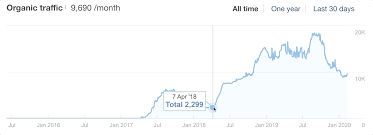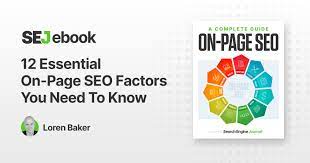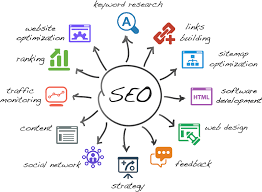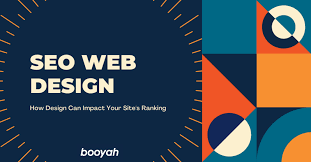Mastering the Art of SEO Copywriting: A Guide to Crafting Compelling Content
The Power of SEO Copywriting
SEO copywriting is a vital component of any successful digital marketing strategy. It involves creating high-quality, engaging content that is not only appealing to human readers but also optimised for search engines. In today’s competitive online landscape, having well-crafted SEO copy can make a significant difference in driving traffic to your website and improving your search engine rankings.
Key Elements of SEO Copywriting
Effective SEO copywriting goes beyond simply inserting keywords into your content. It requires a strategic approach that focuses on the following key elements:
- Keyword Research: Identifying relevant keywords and phrases that your target audience is searching for is crucial for attracting organic traffic to your website.
- Quality Content: Creating valuable and informative content that addresses the needs and interests of your audience helps establish credibility and authority in your industry.
- Optimised Meta Tags: Writing compelling meta titles and descriptions that include targeted keywords can improve click-through rates from search engine results pages.
- Natural Language: While incorporating keywords is important, it’s equally essential to maintain a natural flow of language that reads well for human readers.
- User Experience: Ensuring that your content is well-structured, easy to read, and mobile-friendly enhances the overall user experience and encourages visitors to stay on your site longer.
The Benefits of SEO Copywriting
Investing in professional SEO copywriting offers numerous benefits for your online presence and business growth:
- Increased Visibility: By optimising your content for search engines, you can improve your website’s visibility and attract more organic traffic.
- Better Rankings: Well-optimised content increases the likelihood of ranking higher in search engine results pages (SERPs) for relevant keywords, making it easier for potential customers to find you.
- Enhanced User Engagement: Engaging and informative copy keeps visitors on your site longer, reduces bounce rates, and encourages them to explore more of what you have to offer.
- Higher Conversions: Compelling copy that speaks directly to the needs of your audience can lead to higher conversion rates and increased sales or leads.
In Conclusion
In conclusion, SEO copywriting plays a crucial role in driving organic traffic, improving search engine rankings, and ultimately growing your online business. By focusing on quality content creation, keyword optimisation, and user experience, you can create a powerful digital marketing strategy that resonates with both search engines and human readers alike.
Top 6 Benefits of SEO Copywriting for Your Business
- Increased website visibility in search engine results
- Higher organic traffic from targeted keywords
- Improved search engine rankings for relevant terms
- Enhanced user engagement and longer time spent on site
- Better conversion rates and increased leads/sales
- Establishing credibility and authority in your industry
Challenges of SEO Copywriting: Navigating Keyword Stuffing, Time Constraints, Algorithm Shifts, Competitive Pressure, and Content Duplication
Increased website visibility in search engine results
One of the key advantages of SEO copywriting is the substantial increase in website visibility within search engine results. By strategically incorporating relevant keywords and optimising content for search engines, businesses can significantly enhance their online presence. This heightened visibility not only attracts more organic traffic to the website but also improves the chances of appearing on the first page of search engine results, making it easier for potential customers to discover and engage with the brand.
Higher organic traffic from targeted keywords
One of the key benefits of SEO copywriting is the ability to drive higher organic traffic from targeted keywords. By strategically incorporating relevant keywords into your content, you can attract a more qualified audience to your website. This targeted approach ensures that your site appears in search engine results for specific queries related to your products or services, increasing the likelihood of attracting visitors who are genuinely interested in what you have to offer. As a result, SEO copywriting not only boosts your online visibility but also enhances the quality of traffic coming to your site, leading to improved engagement and potential conversions.
Improved search engine rankings for relevant terms
One of the key advantages of SEO copywriting is its ability to enhance search engine rankings for relevant terms. By strategically incorporating targeted keywords and phrases into high-quality content, websites can increase their visibility and relevance in search engine results pages. This proactive approach not only attracts more organic traffic but also positions the website as a valuable resource for users searching for specific information or products. As a result, improved search engine rankings for relevant terms can significantly boost the online presence and credibility of a business, ultimately driving more qualified leads and conversions.
Enhanced user engagement and longer time spent on site
One significant benefit of SEO copywriting is its ability to enhance user engagement and increase the amount of time visitors spend on a website. By creating compelling and informative content that is optimised for search engines, businesses can capture the attention of their target audience and encourage them to explore further. Engaging copy not only keeps visitors interested but also reduces bounce rates, ultimately leading to a more positive user experience and a higher likelihood of converting visitors into customers.
Better conversion rates and increased leads/sales
One of the key advantages of SEO copywriting is its ability to drive better conversion rates and increase leads and sales for businesses. By crafting compelling and targeted content that resonates with the audience’s needs and interests, SEO copywriting can effectively guide visitors through the sales funnel, leading to higher conversion rates. Optimised content not only attracts more qualified leads to the website but also persuades them to take desired actions, such as making a purchase or submitting an enquiry. This results in a tangible impact on business growth by generating more sales and valuable leads, ultimately maximising the return on investment in digital marketing efforts.
Establishing credibility and authority in your industry
Establishing credibility and authority in your industry is a significant benefit of SEO copywriting. By creating high-quality, informative content that resonates with your target audience and addresses their needs, you can position yourself as an expert in your field. When users find valuable information on your website that answers their questions or solves their problems, they are more likely to trust your brand and view you as a reliable source of information. This credibility not only enhances your reputation within the industry but also builds trust with potential customers, ultimately leading to increased engagement, loyalty, and conversions.
Keyword Stuffing
An inherent con of SEO copywriting is keyword stuffing, where an excessive use of keywords can result in content that feels forced and disrupts the flow of the text. This practice not only makes the content sound unnatural but also diminishes the overall quality of the reader’s experience. When keywords are inserted haphazardly without regard for context or readability, it can detract from the message being conveyed and create a negative impression on both search engines and human readers. Effective SEO copywriting strikes a balance between incorporating relevant keywords and maintaining a natural tone to ensure that the content remains engaging and valuable to the audience.
Time-Consuming
One significant drawback of SEO copywriting is its time-consuming nature. Crafting high-quality SEO copy that resonates with both search engines and human readers demands a considerable investment of time and effort. From conducting in-depth research to developing a strategic content plan, the process of creating effective SEO copy requires meticulous attention to detail. This time-intensive aspect of SEO copywriting can be challenging for businesses seeking quick results or operating within tight deadlines.
Algorithm Changes
One significant con of SEO copywriting is the ever-changing nature of search engine algorithms. Search engines regularly update their algorithms to provide users with more relevant and high-quality search results. However, these frequent changes can pose a challenge for businesses and content creators trying to keep up with the latest SEO best practices. Adapting to algorithm updates and understanding their impact on search rankings requires continuous monitoring and adjustment of SEO strategies, making it a constant battle to stay ahead in the digital landscape.
Competition
In the realm of SEO copywriting, one significant challenge lies in the fierce competition that arises as the practice gains widespread traction. As more businesses and websites embrace SEO strategies, distinguishing oneself from competitors and securing a prominent position in search engine rankings becomes a formidable task. The escalating competition underscores the importance of not only producing high-quality and optimised content but also implementing innovative tactics to capture the attention of both search engines and discerning online audiences.
Content Duplication
Content Duplication is a significant con of SEO copywriting that can have detrimental effects on your website’s search engine optimisation. When content is replicated across multiple pages or websites, it not only fails to provide unique value to users but also triggers penalties from search engines for duplicate content. This can severely hinder your SEO efforts by lowering your website’s ranking and visibility in search results. To maintain a strong online presence and avoid such penalties, it is crucial to focus on creating original, high-quality content that adds value to your audience while adhering to best practices for SEO copywriting.









